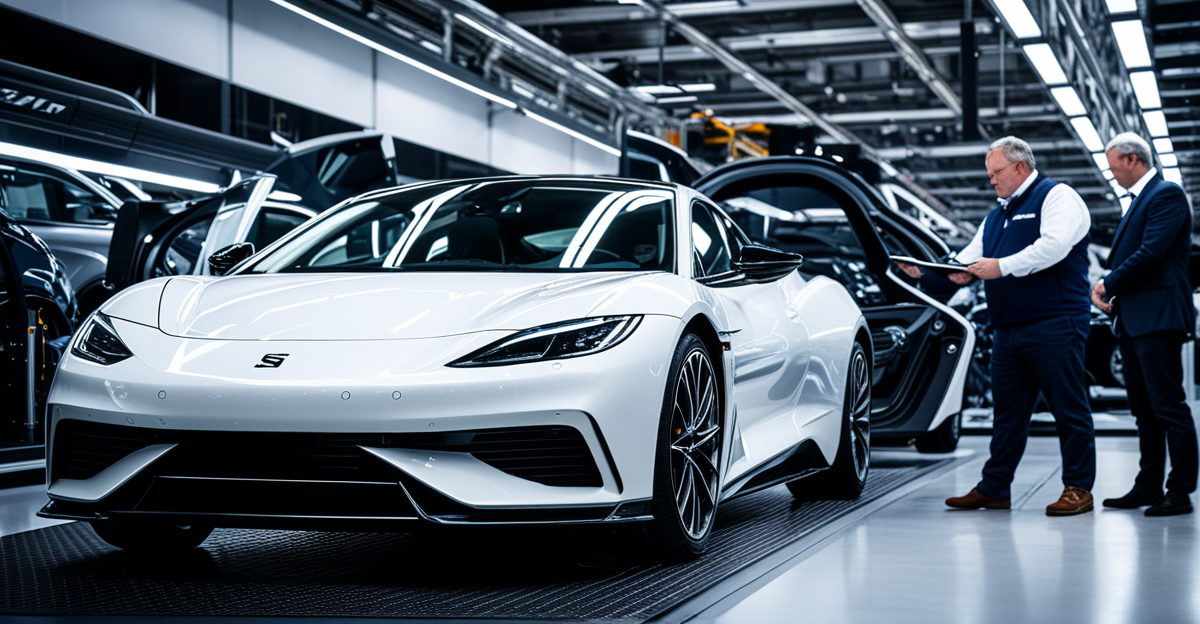Key Future Trends Influencing the UK Automotive Sector
The UK automotive sector is undergoing significant transformations driven by multiple future trends reshaping the industry landscape. Among the primary industry changes, electrification is accelerating rapidly, with government targets propelling the growth of electric vehicles and charging infrastructure. This shift not only affects vehicle design but also demands innovations in battery technology to meet increasing consumer expectations.
Another critical trend is the rise of autonomous and connected vehicles. The UK is actively investing in developing these technologies, including advanced vehicle-to-everything (V2X) communication systems. Real-world trials illustrate the progress towards smart mobility solutions, emphasizing safety and efficiency.
Also read : How is digital transformation impacting the UK automotive industry?
Sustainability also plays a pivotal role in influencing practices across the sector. With stricter emission regulations, automotive manufacturers are adopting greener production methods and exploring circular economy concepts. These innovations reflect a broader commitment to green mobility, addressing environmental concerns without compromising performance.
Collectively, these future trends present both challenges and opportunities for stakeholders. Short-term impacts focus on adapting operations and compliance, while long-term prospects promise a more innovative, sustainable, and connected industry ecosystem in the UK automotive sector.
This might interest you : How Has the UK’s Automotive Industry Adapted to Changing Environmental Regulations?
Electrification and Growth of Electric Vehicles
The electric vehicles UK market is rapidly evolving, driven by ambitious government targets to phase out petrol and diesel cars by 2030. Recent data reveals a sharp rise in EV adoption, with registrations climbing annually as more consumers embrace electric mobility. This shift is a key part of broader electrification trends transforming the UK automotive sector.
Expansion of the public and private charging infrastructure is critical to support growth. Innovations in fast-charging technologies and battery chemistry improvements boost convenience and vehicle range, addressing common consumer concerns. For manufacturers, these trends demand redesigning production lines and investing in battery supply chains to meet increasing demand and regulatory standards.
For consumers, greater availability of EV models at varying price points alongside improved charging networks makes electric vehicles more accessible. Moreover, ongoing advances in battery performance are improving vehicle longevity and reducing environmental impacts. These combined factors accelerate adoption, positioning electric vehicles UK as central to the future automotive landscape.
Understanding these developments helps industry stakeholders anticipate challenges and opportunities. The short-term focus remains on scaling infrastructure and technology innovation, while the long-term outlook envisions a predominantly electric UK fleet supporting sustainable mobility goals.
Advances in Autonomous and Connected Vehicle Technologies
The development of autonomous vehicles UK is progressing rapidly, driven by advances in connected cars and smart mobility systems. These vehicles rely heavily on sophisticated sensors, artificial intelligence, and vehicle-to-everything (V2X) communication, enabling real-time interaction with infrastructure, other vehicles, and pedestrians. This connectivity enhances safety, traffic efficiency, and user experience.
Notably, the UK government supports multiple real-world trials to test self-driving capabilities and V2X applications in urban and rural environments. These pilot projects assess how autonomous systems respond to complex scenarios, a key step in regulatory approval and public acceptance.
Experts highlight that while fully autonomous cars are still in development, incremental innovations in driver assistance and connected features are reshaping the UK automotive sector today. Automakers and tech firms are collaborating to integrate these technologies into production models, moving towards a more connected, intelligent transport ecosystem.
In summary, autonomous vehicles and connected cars exemplify a core future trend. Their continued evolution promises to transform mobility, safety, and urban planning, illustrating how industry changes extend beyond manufacturing to broader digital innovation.
Sustainability and Green Initiatives Shaping the Industry
Sustainability is increasingly central to the UK automotive sector, influencing design, production, and operational practices. Automotive sustainability involves reducing the environmental footprint across the vehicle lifecycle, from raw materials to end-of-life disposal. Stricter emission regulations require manufacturers to lower CO2 outputs and adopt greener technologies. This pushes innovations in lightweight materials, energy-efficient manufacturing, and alternative powertrains beyond electrification.
The UK government’s regulatory framework enforces progressive emission standards, encouraging investment in green mobility solutions. Programs supporting circular economy approaches promote recycling and reuse, reducing waste while enhancing supply chain resilience. Companies in the UK market respond by integrating eco-friendly materials and optimising production to meet environmental targets.
Examples include initiatives to reduce water and energy consumption in plants, alongside designing vehicles that facilitate easier recycling. These combined efforts not only align with legal requirements but also improve brand reputation and consumer appeal. As a key future trend, sustainability drives industry changes that balance environmental responsibility with competitive advantage, securing long-term sector viability.
Digital Transformation and Mobility Ecosystems
Digital transformation is a pivotal future trend shaping the UK automotive sector by redefining how consumers engage with vehicles and mobility services. The rise of mobility services—such as car-sharing, ride-hailing, and subscription models—is shifting traditional ownership patterns. This evolution increases convenience and flexibility, especially in urban regions, while supporting sustainability goals by reducing vehicle usage and congestion.
Technological innovations in digital sales platforms and aftersales services enhance customer experiences. Online vehicle purchasing, remote diagnostics, and predictive maintenance use data analytics and software solutions, streamlining interactions between consumers and manufacturers. These tools aid manufacturers in personalising offerings and responding quickly to market demands.
Industry players are also integrating connected vehicle data to develop smart ecosystems. This integration facilitates industry changes such as real-time traffic management and vehicle health monitoring, improving efficiency and safety. Companies adopting these digital automotive transformation strategies position themselves competitively for the future, responding effectively to evolving consumer expectations and technological advancements.
Government Policy and Regulatory Shifts
Government policies and UK auto regulations significantly influence the UK automotive sector, shaping its trajectory amid rapid industry changes. Recent legislation intensifies focus on emissions, safety standards, and technological adoption, reflecting sustainability and innovation priorities. For example, stricter emission limits reinforce the push toward electric vehicles UK and clean technologies, aligning with broader future trends.
Post-Brexit, regulatory shifts have introduced complexities in trade and compliance. Divergences between UK and EU automotive standards require manufacturers and suppliers to navigate dual frameworks, impacting cost structures and operational decisions. Yet, this also prompts opportunities for domestic innovation and regulatory tailoring supportive of UK-specific industry needs.
Government incentives, including grants and subsidies, play a critical role in accelerating the adoption of green technologies and EV infrastructure. These policies reduce barriers for manufacturers investing in new production techniques and for consumers switching to electric vehicles. Compliance requirements ensure that all stakeholders remain aligned with long-term sustainability and safety objectives.
In summary, evolving government policies act as catalysts for industry evolution, balancing regulation with support to foster a competitive and resilient UK automotive sector that adapts effectively to global and local challenges.
Automotive Supply Chain Evolution and Disruptions
The automotive supply chain UK faces significant challenges due to global events such as the COVID-19 pandemic, geopolitical tensions, and Brexit-related trade complexities. These factors have caused notable supply disruptions, impacting manufacturing timelines and cost structures. For instance, shortages of semiconductors, a crucial component for modern vehicles including connected cars and autonomous vehicles UK, have delayed production schedules across the sector.
To address these challenges, manufacturers are pursuing localisation strategies to reduce dependency on international suppliers and increase supply resilience. This includes establishing regional supply hubs and investing in domestic production capabilities. Additionally, the industry is adopting new materials like lightweight composites and recycled components to mitigate raw material scarcity and meet automotive sustainability goals.
Innovations in supply chain management, such as digital tracking and predictive analytics, enhance visibility and responsiveness, helping to anticipate disruptions before they escalate. These technological industry changes also support flexibility in sourcing and production planning.
In summary, evolving automotive supply chain UK dynamics require proactive adaptation. Combining localisation, material innovation, and digital tools forms the foundation for a more resilient, efficient, and sustainable supply network critical to the sector’s future success.
Key Future Trends Influencing the UK Automotive Sector
The UK automotive sector is shaped by several critical future trends that drive ongoing industry changes and innovations. Electrification remains central, pushing manufacturers to redesign vehicles and invest in battery technologies. Concurrently, advancements in autonomous and connected cars foster a more intelligent, safer driving environment, highlighting the integration of smart mobility systems.
Sustainability is another dominant trend. Stricter emission regulations enforce greener manufacturing and promote circular economy practices. These efforts reduce environmental impact and enhance resource efficiency, shaping long-term industry strategies.
Digital transformation revolutionises ownership and mobility models through shared services and data-driven customer engagement. This shift introduces new revenue streams and operational efficiencies.
Government policies and UK auto regulations heavily influence these trends. Post-Brexit regulatory adaptations, combined with incentives, stimulate innovation while ensuring compliance.
From a supply chain perspective, localisation and material innovation address disruptions caused by global uncertainties. These structural changes build resilience essential for sustaining growth.
Experts agree that the UK automotive sector must navigate these intertwined trends carefully. Short-term priorities include scaling infrastructure and regulatory alignment. Meanwhile, the long-term outlook envisions a dynamic, sustainable, and connected automotive ecosystem adapting proactively to evolving challenges and opportunities.





